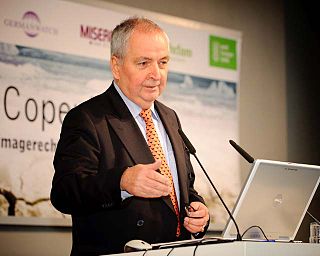Ein Zitat von Cary Fowler
Für viele Menschen ist „Biodiversität“ fast gleichbedeutend mit dem Wort „Natur“, und „Natur“ erinnert an feuchte Wälder und die großen Lebewesen, die dort leben. Fair genug. Doch Biodiversität ist viel mehr als das, denn sie umfasst nicht nur die Artenvielfalt, sondern auch die Vielfalt innerhalb der Arten.
Verwandte Zitate
Ich bin ein großer Befürworter der Bionik und diese Vielfalt in der Natur, diese genetische Vielfalt, gibt es nicht umsonst. Wir als Industrienationen haben schon genug gesündigt und die Artenvielfalt in unseren Ländern deutlich reduziert. Aber jetzt erwarten wir von den armen, weniger entwickelten Ländern der Welt, dass sie ihre Regenwälder, Mangrovenwälder und Korallenlandschaften kostenlos für uns erhalten.
Man kann davon ausgehen, dass wir bei der Geschwindigkeit, mit der wir Lebensräume zerstören, insbesondere, aber nicht ausschließlich, in den Tropen, jede Stunde etwa eine Art aussterben lassen. Dabei sind die Arten nicht mitgezählt, deren Populationen so stark reduziert werden, dass die Vielfalt innerhalb der Population praktisch verloren geht.
Nach Jahrzehnten sorgfältiger Forschung haben Ökologen begonnen, verborgene Ähnlichkeiten zwischen vielen miteinander verwobenen Systemen zu ergründen. ...ein Kanon der Gesetze, Strategien und Prinzipien der Natur... Die Natur lebt vom Sonnenlicht. Die Natur verbraucht nur die Energie, die sie benötigt. Die Natur passt die Form an die Funktion an. Die Natur recycelt alles. Die Natur belohnt Zusammenarbeit. Die Natur setzt auf Vielfalt. Die Natur erfordert lokales Fachwissen. Die Natur dämmt Exzesse von innen heraus ein. Die Natur nutzt die Kraft der Grenzen.
Es muss betont werden, dass es nichts Beleidigendes daran ist, Menschen als Tiere zu betrachten. Wir sind schließlich Tiere. Homo sapiens ist eine Primatenart, ein biologisches Phänomen, das wie jede andere Art von biologischen Regeln dominiert wird. Die menschliche Natur ist nicht mehr als eine bestimmte Art tierischer Natur. Einverstanden ist, dass die menschliche Spezies ein außergewöhnliches Tier ist; Aber auch alle anderen Arten sind außergewöhnliche Tiere, jede auf ihre eigene Art, und der wissenschaftliche Beobachter kann viele neue Erkenntnisse zum Studium menschlicher Angelegenheiten liefern, wenn er diese Grundhaltung der evolutionären Demut beibehalten kann.
Wir haben eine sehr alte Naturschutzbewegung, insbesondere in den Vereinigten Staaten, die sich auf Kampagnen zum Schutz gefährdeter Arten konzentriert: den Fleckenkauz und den Urwald. Aber normalerweise hört es dort auf. Für mich ist Biodiversität das gesamte Spektrum. Beim Artenschutz geht es nicht nur um den Schutz der Wildnis. Es geht auch darum, die Lebensgrundlage der Menschen zu schützen und gleichzeitig die vorherrschende Beziehung des Menschen zu anderen Arten zu verändern. In Indien ist es ein wirtschaftliches Problem, nicht nur ein ökologisches.
Ein Individuum, welcher Spezies es auch immer sein mag, ist nichts im Universum. Hundert, tausend Individuen sind immer noch nichts. Die Arten sind die einzigen Geschöpfe der Natur, ewige Geschöpfe, so alt und so beständig wie sie. Um es besser beurteilen zu können, betrachten wir die Art nicht mehr als eine Ansammlung oder als eine Reihe ähnlicher Individuen, sondern als ein Ganzes, unabhängig von der Zahl, unabhängig von der Zeit, ein immer lebendiges, immer gleiches, ein Ganzes, das gewesen ist in den Schöpfungswerken als Einheit gezählt wird und daher in der Natur nur eine Einheit bildet.
Die Artenvielfalt kann nicht durch den Schutz einiger Arten in einem Zoo oder durch den Erhalt von Grünflächen oder Nationalparks erhalten werden. Um richtig zu funktionieren, braucht die Natur mehr Platz. Es kann sich jedoch ohne menschliche Kosten, ohne Tierpfleger, Parkwächter, Förster oder Genbanken behaupten. Alles, was es braucht, ist, in Ruhe gelassen zu werden.
Wenn man sich diese Wildtiere auf der Welt anschaut, wird deutlich, dass der Mensch in vielerlei Hinsicht von der Natur profitiert hat, aber auch viele Arten an den Rand des Aussterbens gebracht hat ... Das amerikanische Volk, mit dem ich im Rahmen meiner Arbeit bei der IS Foundation interagiere, will das nicht dies zulassen; Sie wollen diese Arten nicht kampflos ziehen lassen; und sie sehen, wie die Natur Menschen auf der ganzen Welt versorgt.
Die Studierenden der Biodiversität, die wir heute in der Wissenschaft am meisten brauchen, haben eine enorme Aufgabe vor der Molekularbiologie und den Medizinern. Die Untersuchung von Modellarten ist eine großartige Idee, aber wir müssen dies mit Biodiversitätsstudien kombinieren und diese angemessen unterstützen, da sie einen Beitrag zur Naturschutzbiologie, zur Agrarbiologie und zur Verwirklichung einer nachhaltigen Welt leisten können.
Wir müssen die menschliche Bevölkerung radikal und intelligent auf weniger als eine Milliarde reduzieren. Wir müssen Nationalismus und Tribalismus beseitigen und Erdlinge werden. Und als Erdlinge müssen wir erkennen, dass alle anderen Arten, die auf diesem Planeten leben, ebenfalls Mitbürger und auch Erdlinge sind. Dies ist ein Planet mit einer unglaublichen Vielfalt an Lebensformen. Es ist kein Planet einer einzigen Spezies, wie viele von uns glauben.
Aber wir müssen hier sagen, dass wir nichts sehen würden, wenn es ein Vakuum gäbe. Dies wäre jedoch nicht darauf zurückzuführen, dass eine Natur die Arten behindert und ihnen Widerstand leistet, sondern auf das Fehlen einer Natur, die für die Vermehrung von Arten geeignet ist. denn die Art ist eine natürliche Sache und braucht daher ein natürliches Medium; aber im Vakuum existiert die Natur nicht.
Wir selbst sind Teil einer Gilde von Arten, die innerhalb und außerhalb unseres Körpers liegen. Aborigine-Völker und die Ayurveda-Praktizierenden des alten Indiens haben Namen für solche Gilden oder Wesen, die (wie wir) aus zwei oder mehr Arten bestehen, die einen Organismus bilden. Der größte Teil der Natur besteht aus Gruppen von Arten, die voneinander abhängig sind.

































